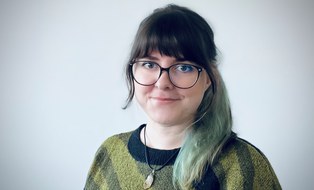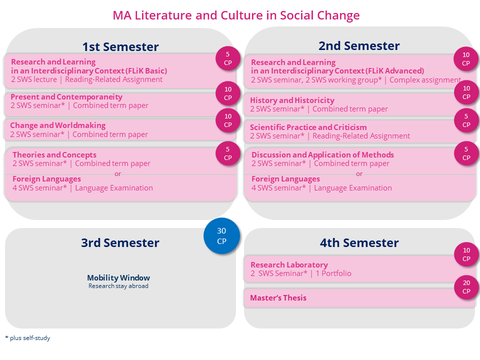Master's programme Literature and Culture in Social Change
Table of contents
The consecutive Master's degree program "Literature, Culture and Societal Change" (LiKWa) can be studied across philology or with a subject-specific focus. The specialization can be chosen from the subjects represented at the faculty:
- English and American Studies
- German Studies and Media Cultures
- Classical Philology
- Romance Studies
- Slavic Studies
Two compulsory elective modules allow for further specialization. Students can choose between a practical language profile or a subject-specific profile.
The course is divided into four semesters. The third semester is reserved for a compulsory stay1. There are also numerous funding opportunities.
The degree program enables students to engage with current social issues across disciplines, such as digitalization, gender and queer studies, future studies and environmental humanities.
Further information on the specializations
Brief profile: The consecutive Master's degree program "Literature, Culture and Societal Change"
- is designed for you as a decidedly research-oriented modularized degree program with a standard period of study of four semesters and 120 credit points. It leads to a professionally qualifying university degree, with which the university degree "Master of Arts" (M.A.) is acquired;
- allows you to acquire specialized knowledge and subject-specific skills in the spectrum of literature, cultural and media studies (admission requirement: BA in this subject profile). This enables you to work independently and autonomously in a wide variety of fields, e.g. in academia, education, (specialist) publishing houses, the media, journalism, cultural management, business and politics or international organizations;
- enables you to achieve this goal through a high level of general qualification in literature, cultural and media studies on the one hand, and a high level of subject specialization on the other. You can choose between a practical language profile and a subject-specific profile and have the option of specializing in one of the five sub-subjects of the SLK faculty(English and American Studies, German Studies and Media Cultures, Classical Philology, Romance Studies and Slavic Studies);
- is research-oriented, interdisciplinary and international. You will acquire theoretical and methodological skills for the critical reflection of historical and, above all, contemporary phenomena of cultural and social change. A compulsory stay abroad and the promotion of your national and international networking will enable you to participate intensively and independently in academic and social discourse as early as the Master's phase.
Information on study requirements and application can be found in the SINS of TU Dresden. If you have any further questions, your academic advisor will be happy to help you.
Jakob studiert den Master LiKWa und hat sich für das Mobilitätsfenster für einen Auslandsaufenthalt in Japan entschieden. Im Vlog nimmt er uns eine Woche lang mit durch seinen Studiumsalltag.
Oliver studiert den Master LiKWa und zeigt uns seine Eindrücke bei Exkursion mit dem Institut für Romanistik nach Apulien. © TU Dresden
Study documents
- Examination regulations from July 27, 2020
- Study regulations from July 27, 2020
- Aptitude assessment regulations from 13.06.2020
- Study schedule
Student advisory service
 © Katharina Fritzsch
© Katharina Fritzsch
Academic Advisor Master EuroS, LiKWa and DH
NameMs Katharina Fritzsch M. A.
Send encrypted email via the SecureMail portal (for TUD external users only).
Academic Affairs Office:
BZW, Sockelgeschoss, Raum ASG06 Zellescher Weg 17
01069 Dresden
Deutschland
Office hours:
by appointment
If you have any questions or problems, please contact the student program coordinator.
Lenny Márki:
Application
The application for the Master's degree program Literature, Culture and Societal Change is open admission (without NC), but provides for a selection interview with each applicant to determine their aptitude. The approximately 20-minute aptitude interviews with two professors of the degree program take place every year between July and mid-September via Zoom. The aptitude assessment procedure serves to determine the particular suitability of applicants for this degree program. To apply, please fill out the application for aptitude assessment and send it to the program coordinator.
Further information can be found at: Information for applicants
Career prospects
Literature and culture are at the center of social transformation processes. The academic skills required to observe, describe and critically question the conditions of these processes are becoming increasingly important. This applies both to the sciences themselves and to the knowledge society beyond the university.
The Master's degree program Literature, Culture and Societal Change (LiKWa) offers you a research-oriented, interdisciplinary and international education in precisely these skills. Through a mandatory stay abroad and the promotion of national and international networking among students, LiKWa enables intensive and independent participation in academic and social discourse as early as the Master's phase. In addition to academia, these include Education, publishing, cultural management, media, scientific and corporate communication, foundations, politics, etc.
Professional training is supported by numerous offers from TU Dresden and its institutions - the Graduate Academy, the Career Service and the International Office. TU Dresden and its partners in DRESDEN-concept also offer the opportunity to orientate oneself in a wide range of professional fields in addition to science, including science communication and science management, modern librarianship, knowledge transfer in museums and other cultural institutions, tourism and communication challenges in business.
Expiring degree programs
The Faculty of Linguistics, Literature and Cultural Studies offers the consecutive Master's degree program for all students who started their studies between the winter semester 2013/14 and 30.09.2020.
The regulations of the expiring Master's degree programs can be found here. Please note the alternative offerings for the minor subjects in the Faculty's Master's degree programs.
Additional information: Double Master's program with Università di Trento
The double Master's program "Dresden-Trento" offers the opportunity to obtain a double degree while studying at the partner university in Italy. The planned program can be easily combined with the mobility window or research stay abroad provided for in the study regulations of the LiKWa degree program. Courses at the Università di Trento are offered not only in Italian, but also in English, German, Spanish, French and, in some cases, Russian. If you are interested, you can find more information on the Doppia Laurea website.
Frequently asked questions
Students of the Master LiKWa can specialize in one of the five departments of the SLK faculty. German Studies and Media Cultures, English/American Studies, Slavic Studies, Romance Studies and Classical Philology are available.
The main focus is determined at the end of the study program. Students can have a specialization in their chosen field of study shown on their diploma, as long as they have received 60 credit points in this field during their studies. In addition, the master thesis must have been completed in the respective department.
Credits for the main focus can be obtained in each module, except in the language courses where a practical language profile is required. (Even if the language practical profiling was chosen, there are enough modules left to set a focus).
No. Students can also study on a broad basis and attend seminars according to their interests, without having to worry about the necessary credits and their affiliation.
Practical language profiling means that you can take language courses in the first and second semester with 4 semester hours per week each. You can use the language courses offered by the faculty or TUDIAS. For both options you will find information under point 1 (Foreign Languages) under this link.
If you decide on a practical language profile, please contact the coordination of the MA LiKWa.
Scientific profiling means that instead of the language courses you will take the modules "Theories and Concepts" and "Method Discussion and Application". Please refer to the Course Catalogue for information on the courses you can take to complete these two modules.
No, you don't have to. You can take an A1 course in French in the first semester and a B2 course in Russian in the second semester. However, the language course offer depends on the offer of the respective institute (e.g. the Institute of Slavic Studies cannot offer the A1 and A2 courses every semester for capacity reasons) or TUDIAS.
Please contact the responsible persons listed (listed under 1.Foreign Languages).
Yes, the stay abroad is individually tailored to the interests of the respective students. This requires advice from the study program coordinator. Together we will try to find a partner university in the respective desired field of study. You are also welcome to find universities or offers yourself, which you can then suggest to the coordination. The only premise is that it must be a research stay.
A list of university cooperations in the respective department and information about Erasmus+ can be found here.
No, internships or regular study visits do not count. It must be a research stay.
The students are responsible for financing themselves. However, there is the possibility to receive funding through Erasmus+. Please follow this link or contact the International Office. Of course you can also use other scholarships.
You register using the form provided by the Examinations Office. The Master's thesis takes 17 weeks to complete and 20 credit points are earned.
You will be informed of the deadline when you register. If you have any outstanding examinations, you will also be informed of these. You can register your Master's thesis at any time, even if you are still missing examinations.
Footnotes
-
In justified exceptional cases that make a stay abroad impossible, alternative solutions can be sought with those responsible.

